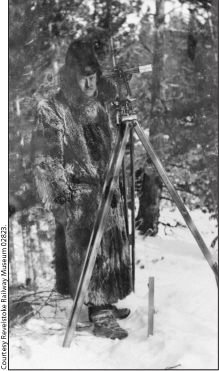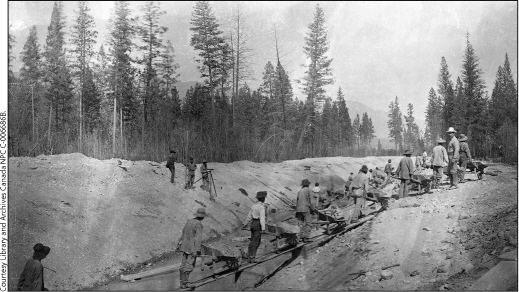

Dukesang took a deep breath and began talking.
“The worst part was last winter. There was no work for me and my gang of thirty. All the construction stopped for the winter, along with our pay, and we were all hungry. Every morning when I awoke, I wondered if I would have to bury another of my men.”
Dukesang told Edward that he was the youngest and strongest of the workers, but even he was beginning to suffer from beriberi. It was a terrible disease that the Chinese called black leg; it came from subsisting on a diet of just rice. Dukesang and his men seldom got to eat any vegetables or meat. As the spokesman for his crew, he often complained to the White foreman but it did no good.
One day early in 1885, with the ground still frozen, Dukesang went over to his friend Wing Sun’s bed mat. Wing’s legs were swollen, and he complained of terrible pains in his chest and his head. Dukesang felt bad that he had no more bok choy, which he had grown in a small wooden box. The leafy green vegetable would have made a good soup to serve his dying friend.
Later that day, Wing breathed his last. The few pennies he had managed to save weren’t enough to send his bones back to Saltwater City — the Chinese name for New Westminster — let alone China. Dukesang had to put his body in the forest and wait until the ground thawed enough to bury him.
“So many of us suffered and died, I cannot count them all. My dying countrymen prefer to spend their last days in the opium shacks. The delirium of the opium at least releases them from their awful hardships. What else could they do? What hope did they have?”

Railway building stopped during winter, but warmly dressed surveyors pressed on.
It had been four years since he had joined the six thousand Chinese coolies — as their White bosses called them — who were brought to Canada to build the railway.
“As soon as they heard I could speak some English, they hired me. My countrymen asked me to speak for them. But that did not relieve me of my share of the work. Whether it was carrying nitroglycerine packed in straw or drilling holes in the rock or hauling away the rock after the blasts, I always did my share.”
Dukesang was slight of build, with black hair and dark eyes. He had a lively look about him, and was quick to make a joke or laugh.
“I have written it all down in my journal, in Mandarin. I want my children and my grandchildren, when they come into the world, to have this record of all the important things that have happened to me here on Gold Mountain.”
Dukesang explained that, as his father’s only son, he had enjoyed many privileges but had also carried many responsibilities back home in China. It was up to him to absorb his lessons in writing, astronomy, and geography, and to learn the ways of peace and harmony that were being passed on to him. Most of all, he had to maintain the family honour, which was important above all else.
When he was still a boy, disaster befell his family. Dukesang’s father was a government official, a judge who settled disputes over land ownership. In the last case he handled, he rendered a decision that cost a family some of its land, and the family took revenge by bribing a servant to poison him at a banquet.
“My mother was beside herself with grief. She committed suicide. It was a great dishonour to our family. She couldn’t be buried in the family cemetery and had to be put to rest in common ground, along with peasants and homeless wanderers. But she left a note for me, which told me to present a good face to the world and to make wise use of my learning.”
Dukesang told Edward how he had travelled to the great capital Peking and on to a city on the North China seacoast. There he got a job tutoring the eldest son of the warlord Sen Yutseng.
“One day while I was meditating in the garden, my eyes fell on a beautiful young girl whose name was Lin. She was the daughter of the neighbour, Yin-Ling. She was too young to marry, but Yin-Ling promised me that this girl would some day be my wife.”
First, however, Dukesang had to wait for Lin to grow up. This would give him time to gain enough wealth to buy land and a home for his bride. So it was that he decided to travel to North America.
In the summer of 1880, Dukesang boarded a small three-masted wooden ship to sail to Portland, Oregon, along with several dozen peasants who were fleeing famine in the south of China. The voyage cost forty dollars each, and many of the poor, landless peasants had raised the money by signing over their children to wealthy farmers for years as servants.
Tea was served once a day, with a hundred grams of rice per person. Once they’d arrived in Portland, everybody was kept on board for another three weeks until they could be given a clean bill of health.
“One of my countrymen wrote a poem about that time, I will recite it for you:
Destitute, no fuel or food,
We borrow money to go abroad.
No matter what we say or do,
The customs men won’t let us through,
Like convicts, locked up in some island cell,
We rail against this unjust hell.”
They were finally allowed onshore to take their first look at this strange, foreign land. Dukesang soon discovered that life on Gold Mountain was nothing like he had expected.
After a damp and chilly winter working odd jobs, relying on what fish he could catch in the Columbia River for food, Dukesang heard about the new railway being built further north. He moved to New Westminster and became a navvy on the Fraser River section of the Canadian Pacific Railway.
“I did all the rough jobs, like breaking rock and helping to drill tunnels through the canyon walls over the river.”
Edward had seen many Chinese workers moving great piles of rock clad only in sandals and thin cotton pants and blouse, and asked Dukesang why they had such poor clothing.
“We have no money to buy anything better. Sometimes, in winter, we wrap burlap bags around our feet. We work twelve hours a day, six days a week and we’re paid seventy-five cents a day. Just half what the White workers get. And we have to provide our own clothing, food, and tools. I had the sad duty of watching many of my friends die. They were just a small number among the hundreds killed by disease and accident.”
Dukesang admitted that he often wondered if this huge project to build a railway across Gold Mountain was not just a wild dream, something that would never be accomplished. But he believed that a civilized man could be distinguished from a barbarian by his quiet acceptance of life’s misfortunes.

Chinese workers, seen in this photo from 1881, faced injury or death every day because of their very dangerous work.
“All the lighter types of work — surveying, supervising the labourers, driving the locomotives — is kept for the Whites. The heavy, dangerous work is left to the Chinese.”
Edward asked Dukesang about the rumours of riots he had heard.
“Yes, there have been riots. One day, a foreman refused to pay the wages owed to two workers he had fired. My countrymen hurled rocks at the foreman and his timekeeper and they both showed blood. That night, our camp was attacked by twenty White men. One Chinese man was killed and many hurt. The White doctor refused to treat them.”
Picking up his journal, Dukesang translated for Edward an entry he had written.
So many of us Chinese have suffered and died here recently, I cannot recount them all. But the Western people will not allow any more of us to land here now, although they scold us for not working enough. How these things wear my soul down to nothing. But my words are meaningless, and my speech now falls upon deaf ears and closed eyes. These mighty lands are great to gaze upon, but the laws made are so small.
“The men in my camp all come from remote villages,” Dukesang continued, putting his journal down. “They cling to their old ways, keeping their pigtails as a symbol of loyalty to the emperor. They wear their loose coolie jackets, cotton trousers, and flimsy slippers. And most don’t even attempt to learn English. Why bother? They think that they will soon have enough money to return to China, to live in comfort on their Gold Mountain dollars. But very few ever will. Most just grow sicker and weaker each year.
“We thought we would never see spring: no rice shipments had come for months.”
Finally, a boat from China docked in Saltwater City just in time, bringing with it twelve hundred portions of rice, a month’s supply for each man. Soon, the first asparagus shoots made their appearance, and before long Chinese cooks were putting the first green vegetables they had seen in months into their cooking pots.
By the time Edward sat listening to this tale, Dukesang was counting the days until his work would come to an end. He had buried his friend Wing Sun’s bones and apologized to his spirit that there wasn’t enough money to send his body to Saltwater City. Many of the labourers who worked with Dukesang planned to go to Victoria. There were many Chinese people there already, and they would be able to live among their countrymen, dreaming of the day when their wives and families could join them. Others had already left the work gangs and had started panning for gold in the Fraser River. So many of Dukesang’s countrymen gathered at one place on the river that it came to be known as Chinaman’s Bar. But Dukesang told Edward he had other ideas: he had decided that his future lay in Saltwater City. That was where he would go once the railway was finished.
“Maybe I’ll be able to marry Lin and bring here to Gold Mountain,” Dukesang said. There was a catch in his throat as he spoke.
A Voice for the Voiceless
Dukesang Wong survived the terrible ordeals the Chinese workers suffered during the building of the CPR and, in his journal, left one of the very few written records by those who had come to Gold Mountain to find their fortune. Through his words, he has given a voice to the voiceless.
He fulfilled his ambition to become a tailor in New Westminster and returned to China to marry his childhood sweetheart Lin and bring her to Canada. He had to pay a fifty dollar head tax before she was allowed into the country. The tax was later increased to five hundred dollars, and further Chinese immigration was prohibited. The head tax was abolished in 1947, and in 2006 the Canadian government apologized for the tax and for mistreatment of early Chinese immigrants.
Dukesang Wong died in 1918. His descendants live on today in British Columbia.
Edward left Dukesang’s tent late that night. As he wandered back to where he had left Blackie safely tethered beside his sleeping bag, he thought about what he had just heard.
They’re just people like us. They want to get this railway built, and then they want to live with their families.
The thought of family made Edward a little sad. But he knew that it wouldn’t be long before the Last Spike was driven. There’d be time enough for family after that.